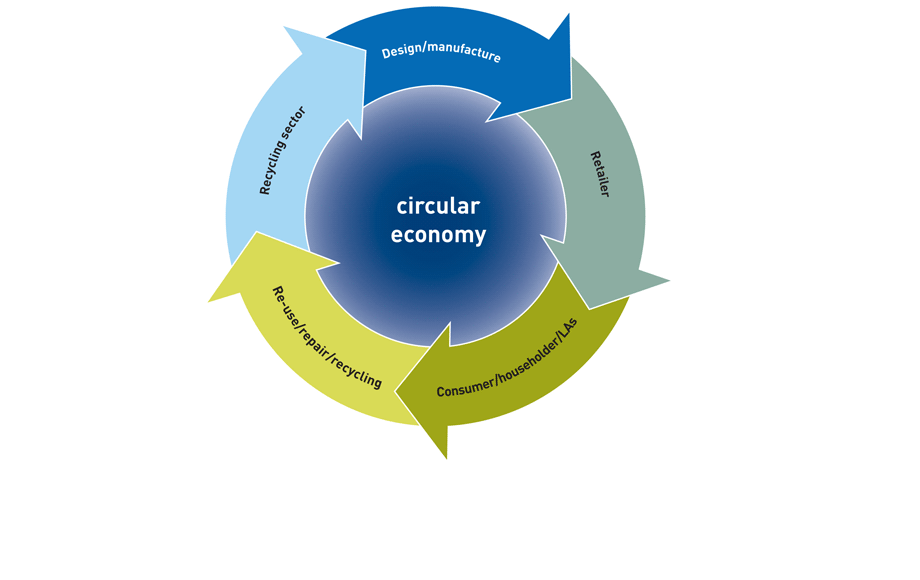
Plastic is a problem, with visible and hidden impact, and is rightly the focus of much attention. But course it’s not the only material that harms the environment. There’s all the other stuff we buy, use for a while and then probably throw away, with its constituent materials and the energy embedded within it; that technical term, stuff, being in this case all the human-made things in our homes, from bedsheets to bicycles, from cookers to crampons. It’s been estimated that the manufacture, use and disposal of stuff requires more energy than flying, food, or heating and lighting. There are many means dependent on initiatives by industry to reduce the environmental impact of all this stuff.
Electrical products
In their detailed report on Reducing the environmental and cost impacts of electrical products, WRAP mentions:
materials – alternative, renewable, recycling and re-use
processing – low energy, low waste
distribution – more efficient distribution models
use – more efficient technology, better user education or ‘intelligent’ products
end of life – extraction of value (material and financial).
At the individual end of the scale, you can help by buying better quality products and keeping them for longer, but you may not be able to afford to do that. You can also mend things as they break down, displacing the material with labour, but you may not have the skills or the time. And, as with most environmental issues, the picture is complicated: WRAP states that replacing an inefficient washing machine with an AAA+ rated one creates a lower impact than repairing it.
Repair cafes
For those who can’t afford high-end white goods or other more durable kit, and whose skills don’t include reupholstering their favourite armchair or retuning their creaking bicycle, there are various initiatives that can help.
You could take your broken goods to one of a network of Repair cafes to be repaired, or learn from a specialist at a Repair Café how to do it yourself. These are community affairs, drawing on skills of local people to help their neighbours.
People from High Peak transition groups recently went to a talk by Chris Blomeley from Essex, who, moving on from simple repair cafes, now runs a Community Interest Company which repairs electrical goods, working in partnership with local organisations such as the local Council. Chris and his apprentice not only repair people’s domestic appliances but also rescue those which would otherwise go for recycling or to landfill and sell them on after refurbishing them if needed. In this way they not only benefit the community and the environment, but also save people money and make money for themselves. In another project, young people have been trained to rebuild bicycles rescued from local authority waste streams. The trainees received a newly refurbished bike and learnt a useful skill.
The meeting considered how feasible it would be to establish a similar CIC in High Peak, and thought that there’d be sufficient support for this. So did some informal chats beforehand with people who aren’t necessarily green activists – but who would need to be involved to make things work (!)
Transition Buxton and Transition New Mills have already thought of holding repair cafes, and there was discussion about how this might happen. It’s certainly possible with a large enough population to sustain activity, although a regular repair café might not be feasible in a small community. Not unexpectedly, there are other concerns about setting one up: issues brought up included funding streams, how you get repairers with the right skills, and what to do if your volunteers don’t have the right qualifications.
Meanwhile, Sheffield and Chesterfield both hold monthly repair cafes, and already established at a more local level are Buxton and Glossop Freecycle groups, where you can post goods you no longer want.
Redesign

Then of course, we need to add a fourth R to Reduce, Repair, Recycle, and that's redesign. At the moment, many products are designed in a way that actively hinders repairing them. Replacement parts are often so expensive that you might as well buy a new product. Of course, there is the argument that newer designs may be more efficient and less polluting, but surely it isn't beyond the ingenuity of engineers capable of building so many complex products to design products that can easily be upgraded. Let's look to a future when you won't need to throw out old washing machine when a newer, more efficient design comes along.
Even when stuff has reached the end of its useful life in its current reincarnation, it could - if properly designed - be returned to the manufacture where it would be disassembled so that the parts could be reused in future products - making a circular economy where waste is minimized, rather than the linear economy we have now where stuff is just thrown away.
Green party policy
Together, the technical ideas from WRAP and local initiatives described here are in line with the Green Party’s Industry policies, as well as Green Party Natural Resources and Waste Management policies mentioned in an earlier post. For example:
IN212 The nature of some industrial sectors must change, such as from resource extraction to the 'circular economy'.
IN407 Industrial production should minimise embodied carbon, operational carbon (including maintenance) and end-of-life carbon (waste), in part through inspiring new community and user behaviour. … Industrial production should follow the waste hierarchy and deliver zero waste without incineration (see Resources): it should focus on waste reduction and reuse, repair and, refurbishment, high-value recycling, composting and anaerobic digestion, before downcycling (material recovery), energy-from-waste (including incineration) or landfill.
IN409 A Green Industrial Strategy for the UK combines three approaches … supporting the development of local resilience and new sectors in a systemic way …
Supporting local communities to choose their own transition path, to become more self-reliant, reflecting local history, ecological profile and needs.
